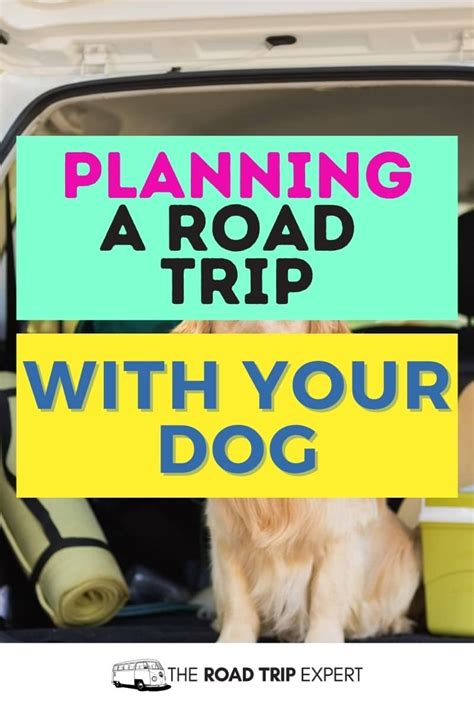Embarking on a road trip with your furry companion is an experience that will create lasting memories and strengthen the bond between you and your dog. However, planning a successful road trip requires careful preparation and consideration for your dog’s comfort and well-being. This comprehensive guide will provide you with everything you need to know to ensure a safe, enjoyable, and stress-free road trip with your canine friend.

Planning the Itinerary
1. Choose Dog-Friendly Destinations:
- Research pet-friendly hotels, motels, and campgrounds along your route.
- Check if any attractions, restaurants, or parks you plan to visit allow dogs.
- Consider destinations with plenty of green spaces and dog parks for exercise and socialization.
2. Plan for Rest Stops:
- Schedule regular rest stops every 2-3 hours to give your dog a chance to stretch, relieve themselves, and hydrate.
- Choose rest areas with designated pet areas or green spaces.
Vehicle Preparation
3. Dog-Proof Your Car:
- Secure loose items that your dog could chew on or swallow.
- Cover seats with blankets or a dog bed to protect them from hair and dirt.
- Place a crate or pet carrier in the car for your dog’s safety and comfort.
4. Dog Seatbelt or Harness:
- Use a dog seatbelt or harness to restrain your dog while driving.
- Ensure the restraints are crash-tested and properly fitted for your dog’s size.
Pet Supplies Packing List
5. Essentials:
- Food and water bowls
- Sufficient food for the duration of the trip
- Plenty of fresh water
- Medications (if needed)
- Collar with ID tag
- Leash
6. Comfort Items:
- Dog bed or blanket
- Favorite toys
- Calming aids (e.g., pheromone spray, calming treats)
7. Safety Gear:
- Dog crate or carrier
- Dog seatbelt or harness
- First-aid kit for pets
Dog Care on the Road
8. Exercise and Hydration:
- Provide your dog with regular exercise and hydration at rest stops.
- Bring portable water bottles and collapsible food bowls.
- Avoid overfeeding your dog before or during the drive.
9. Motion Sickness Prevention:
- If your dog is prone to motion sickness, consult with a veterinarian about preventive medications.
- Open windows for ventilation and provide fresh air.
- Consider using a calming aid to reduce anxiety.
10. Heat Stroke Prevention:
- Never leave your dog unattended in a parked car, even with the windows cracked.
- Provide plenty of shade and water during breaks.
- Monitor your dog for signs of heat stroke (e.g., excessive panting, lethargy).
Table 1: Dog-Friendly Hotels and Motels
| Hotel/Motel | Location | Amenities |
|---|---|---|
| La Quinta Inn & Suites | Nationwide | Pet-friendly rooms with no additional fees |
| Best Western Plus | Over 2,000 locations worldwide | Designated pet areas, dog beds available |
| Kimpton Hotels | Major cities | Welcome dogs of all sizes, plush dog beds provided |
Table 2: Dog-Friendly Campgrounds
| Campground | Location | Amenities |
|---|---|---|
| KOA Campgrounds | Nationwide | Designated pet areas, dog parks, and pet-friendly cabins available |
| Jellystone Park | Over 70 locations | Pawsitive Pools for dogs, dog agility courses |
| Thousand Trails | Over 80 campgrounds | Pet-designated areas, dog showers, and dog-friendly activities |
Table 3: Dog-Friendly Attractions and Restaurants
| Attraction/Restaurant | Location | Amenities |
|---|---|---|
| Walt Disney World | Orlando, Florida | Designated pet areas in theme parks, pet-friendly restaurants |
| The Henry Ford Museum | Dearborn, Michigan | Dog-friendly outdoor areas, water bowls provided |
| DogBar | San Francisco, California | Dog-themed restaurant with a dog-friendly patio |
Table 4: Dog First-Aid Tips
| Situation | Action |
|---|---|
| Bleeding | Apply pressure to the wound with a clean cloth or gauze |
| Broken bone | Immobilize the area and seek immediate veterinary attention |
| Burns | Cool the burn with running water and seek veterinary attention |
| Heat stroke | Move the dog to a cool area, cool the body with water, and seek veterinary attention |
| Ingestion of toxic substance | Contact a veterinarian or animal poison control center immediately |
Additional Tips:
- Consider using a GPS pet tracker to keep an eye on your dog at all times.
- Be aware of local leash laws and regulations.
- Pack extra supplies in case of unplanned delays.
- Allow your dog to adjust to being in the car gradually before embarking on a long trip.
- Stay calm and patient during the journey, as your dog may experience anxiety.
- Have fun and enjoy the adventure with your furry best friend!
